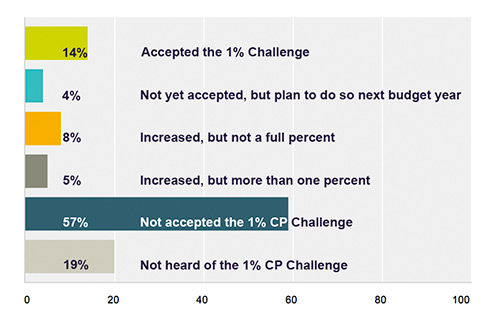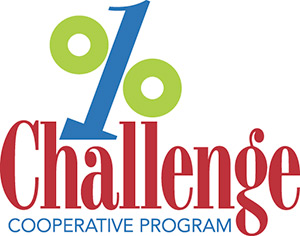Fewer than one in five pastors who responded to an informal online survey told The Baptist Courier their churches have accepted or plan to accept the 1% Cooperative Program Challenge.
The 1% Challenge was launched by the Executive Committee of the Southern Baptist Convention in 2011 to encourage churches to increase their Cooperative Program giving by at least 1 percent.
The Cooperative Program, established in 1925, is the means by which Southern Baptists work together to provide financial support for the missions and ministries in their respective states, across the nation and around the world.
 Question: Has your church accepted the 1% Cooperative Program Challenge? (This Baptist Courier survey is not scientific and reflects the responses only of those online users who chose to participate.)
Question: Has your church accepted the 1% Cooperative Program Challenge? (This Baptist Courier survey is not scientific and reflects the responses only of those online users who chose to participate.)Of 103 pastors who responded to the Courier survey, 14 said their churches have accepted the challenge, and four said their churches plan to do so in the next budget year.
However, more than three-quarters of pastors in the Courier survey said their churches have not accepted the 1% Challenge or have not heard of it.
(Want to take the survey? Click here.)
The results of the Courier survey differed only slightly from those of a May 2012 LifeWay Research survey of 1,066 pastors from across the Southern Baptist Convention.
Nearly 40 percent of pastors in the LifeWay survey had not heard of the 1% CP Challenge. Another 42 percent said they had not accepted the challenge.
Seven percent of pastors said their churches had accepted the 1% CP Challenge, with another 8 percent planning to do so in the next budget year.
Some pastors who responded to the Courier survey questioned whether churches that already give 10 percent or more of undesignated receipts through the Cooperative Program should be asked to give more.
“We already give 10 percent of our money to the Cooperative Program,” a pastor wrote. “The churches that are not giving need to increase their giving.”
Another pastor said the 1% Challenge “is only for those who fail to tithe back as a church through the CP.”
A pastor whose church gives 11 percent annually through the Cooperative Program said his congregation doesn’t need a “challenge” in order to promote CP giving. “We believe in [the Cooperative Program] strongly and will continue to support it as much as we can,” he said.
Other respondents in the Courier survey indicated a desire to lead their churches to increase CP support but cited decreased overall giving as an impediment. “We still have difficulty meeting our greatly reduced budget at this time,” one pastor said.
Another pastor said he was employing “all [his] leadership skills to try to keep the church from lowering CP giving. It’s an uphill battle.”
Still another pastor said it will “take some time to educate our people as to the meaning and importance of the Cooperative Program just to maintain our 10 percent.”

Jim Austin, executive director-treasurer of the South Carolina Baptist Convention, said CP awareness is a top priority for his staff. “Just about everything we mail out from our building includes something about the 1% Challenge,” he said. “That will continue to be a message we trumpet here.”
Gary Anderson, SCBC director of the church health and Cooperative Program group, said the state convention will be promoting the 1% Challenge “a great deal more this coming year,” including setting up a section on the SCBC website in coming weeks for churches to sign up for the challenge.
The 1% Challenge is “a succinct way to do something more – an understandable way to say, ‘Yeah, we can do that,’?” said Frank Page, president of the Southern Baptist Convention’s Executive Committee. “It is understandable, is easily acted upon, and can be done without shifting major sections of a church’s finances.”
Two pastors in the Courier survey indicated they led their churches to raise CP support because they supported the recommendations contained in the Great Commission Resurgence report adopted by South Carolina Baptists in November 2011.
During the months before the adoption of the GCR report, Ralph Carter, who chaired the task force and now serves as SCBC president, urged pastors to accept the 1% Challenge. At the time, at least 31 pastors led their churches to do so, representing a potential $320,000 in additional funding to the Cooperative Program.
Nationally, over the last 25 years, the average percentage forwarded from Southern Baptist churches through the Cooperative Program has declined by almost one half – from 10.52 percent in 1987 to 5.41 percent in 2011.
In South Carolina, giving from churches through the Cooperative Program – as a portion of undesignated receipts – declined from 8.7 percent in 2000 to 6.9 percent in 2011. (CP giving statistics for 2012 will be available in February.)
According to Anderson, 301 SCBC churches (approximately 14 percent) give 10 percent or more of undesignated receipts through the Cooperative Program. An additional 73 churches give more than 9.5 percent, he said.
The LifeWay Research survey showed that Southern Baptist pastors who are 55 and older are more likely to support the Cooperative Program, believing the CP supports missions and ministries their churches value. They also are more likely to think convention entities use their CP contributions effectively and to place a higher value on the ministries the CP supports.
Younger pastors (ages 18-44) are less likely to believe the convention’s entities use their CP contributions effectively and are less willing to agree that the CP supports SBC ministries and missions their churches value.
Sunday, April 14, is Cooperative Program Day across the South Carolina Baptist Convention. Anderson said SCBC staff members will be available to speak in churches that day or on any Sunday during April.
Anderson noted that the convention’s website (scbaptist.org/cooperativeprogram) has downloadable resources available to churches interested in promoting the Cooperative Program.
– With reporting from Baptist Press.